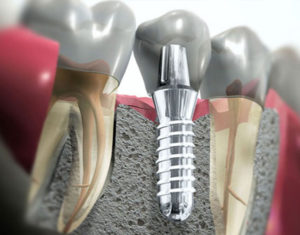Implant failure is a risk that can be incurred following an implantology intervention in the event that particular conditions occur.
Commonly, thinking of dental implants as foreign bodies that are inserted inside our organism, in the mouth precisely, we associate the implant failure with the rejection of the implant.
In reality it is wrong to speak of rejection of the implant because the implant is made of titanium and titanium is an extremely biocompatible material with our body. This means that bone and titanium screw are perfectly compatible with each other, the body does not tend to expel the implant; we can only speak of implant failure when there is a lack of osseointegration (screw and bone do not perfectly integrate).
Causes that determine implant failure
Implant failure can be due to multiple causes, some factors lead to immediate implant failure, others to late failure.
An immediate implant failure, i.e. a failure that occurs a few months after the intervention, is mainly due to the following causes:
- Incorrect intervention planning
- Use of low cost systems
- Pre-existing gingival infections
Correct intervention planning is used to evaluate the patient’s bone quality and choose the most suitable materials. The experience of the dentist is fundamental for defining the best strategy for implant positioning and at the same time, making use of a specialized dental center means being able to count on a wide variety of high quality materials. When all these conditions cannot be guaranteed, it is possible that the guarantee of the system will be compromised.
Pre-existing gingival infections, such as periodontitis can be, however, can cause serious complications if they are not treated before undergoing an implantology operation. Inserting dental implants with an ongoing infection, especially in case of periodontitis, could result in the fall of the implants.
Smoking represents an obstacle to the success of an implantology intervention. In addition to slowing down wound healing, smoking can facilitate inflammation of the tissue surrounding the implant which could in turn degenerate into peri-implantitis.
A late failure, i.e. a failure that can occur even years after the intervention, can instead be caused by:
- Periimplantitis
- Poor oral hygiene
Peri-implantitis can cause implants the same damage that periodontitis can cause to natural teeth. The process is the same: plaque and tartar attack the bone, undermining the stability of the implants.
Peri-implantitis can occur even after years, after osseointegration has already taken place. The main cause is poor oral hygiene and lack of care for the implants.
Perimplantitis can be remedied with a diagnosis and timely intervention, eliminating the bacterial load, if neglected it can lead to the loss of the dental implant.
Last but not least, oral hygiene. Adequate cleaning is indispensable to prevent implant failure. You must take great care of the dental implant, both in the home oral hygiene (correct use of the toothbrush, specific accessories for a deep cleaning), and in the care to periodically schedule check-ups and professional cleaning.
How can implant failure be avoided?
Implant failure can be avoided thanks to a careful evaluation of the initial clinical case. A good preimplant planning aims to insert customized dental implants. Relying on a dental center like ours that uses innovative technologies, which has a wide range of quality materials to choose from, which adapts the implants to the needs of the individual patient, greatly reduces the risk of implant failure.
A long and proven experience in the field of implantology can be crucial for the success of an intervention. Finding the best solution for each individual patient is not as obvious as it seems, often in fact, the standardized insertion of dental implants for each type of patient can be among the causes of an immediate implant failure.
















